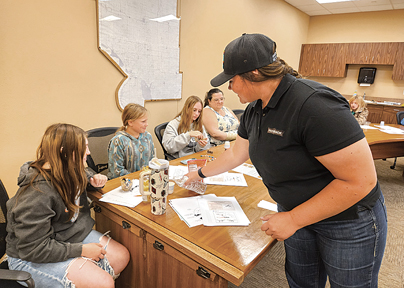Local 4-H Members Attend LQA Training

Area 4-H members participated in a Livestock Quality Assurance (LQA) training held at the Mountrail County South Complex on Wednesday, June 18. This certification is a requirement for all 4-H youth exhibiting livestock in 4-H competitions at the North Dakota State Fair. Youth may complete either the Livestock Quality Assurance (LQA) or Youth for the Quality Care of Animals (YQCA) certification.
The training focused on three key components of animal care and handling.
The first session, led by Lynnette Vachal with Mountrail County Extension, focused on the proper handling and care of animals, as well as understanding animal behavior. Youth engaged in hands-on lessons to explore concepts such as blind spots, flight zones and the point of balance. They learned that the flight zone size varies depending on how comfortable an animal is in its surroundings. Participants discovered that entering an animal’s blind spot can startle it, potentially causing it to kick or flee. They also learned how to effectively move animals by positioning themselves correctly in relation to the animal’s point of balance, behind the shoulder to move the animal forward, and in front to encourage it to back up.
In the second hour, Kaitlyn Metzger with CHS presents a lesson on animal nutrition. Youth were given a hands-on activity that demonstrated the importance of properly mixing feed rations. Using a variety of food items to represent different feed ingredients, participants attempted to create evenly mixed rations. The activity highlighted the need for consistent measurement and mixing to ensure balanced nutrition for livestock. At the end of the lesson, youth enjoyed a fun “feed ration” snack.
The final hour was led by Mariah Jacobs with Northwest Veterinary Services, who presented a lesson on proper injection techniques. Youth practiced giving simulated injections using food coloring and oranges. This allowed them to see how various injection methods (subcutaneous, intramuscular, and intradermal) affect where the medication is delivered and how it disperses. By cutting into the oranges, participants could evaluate the accuracy and effectiveness of their technique.
The training offered valuable, hands-on experience in responsible livestock care and reinforced skills needed to raise healthy animals while maintaining proper safety and ethical standards.
Participating in 4-H Livestock Quality Assurance (LQA) training provides a range of benefits for youth involved in animal projects. These benefits span across ethical, educational, and personal development areas:
1. Animal Care and Welfare
Teaches proper handling, feeding, housing and health practices.
Reinforces the importance of providing humane, ethical treatment of livestock.
Helps youth recognize signs of illness or stress in animals and take appropriate action.
2. Food Safety Awareness
Educates youth on how their actions affect the safety and quality of the food supply.
Covers withdrawal times for medications, cleanliness, and proper record keeping to ensure safe products enter the food chain.
3. Ethical Decision-Making
Encourages responsible behavior and ethical choices in animal management.
Emphasizes honesty in record keeping, treatment administration, and fair competition.
4. Responsibility and Accountability
